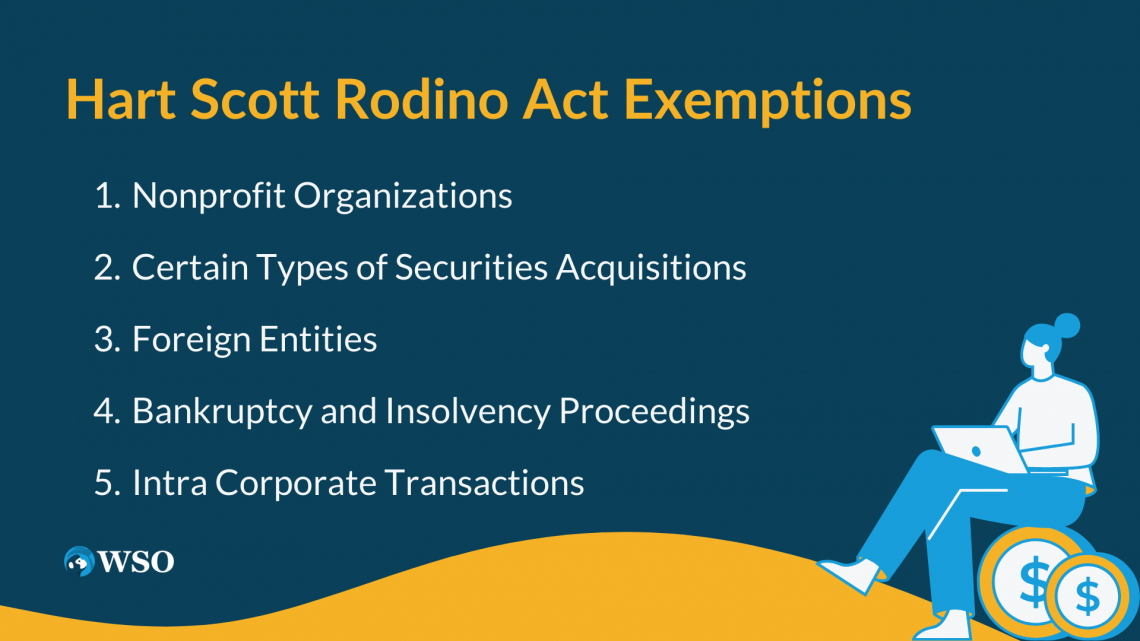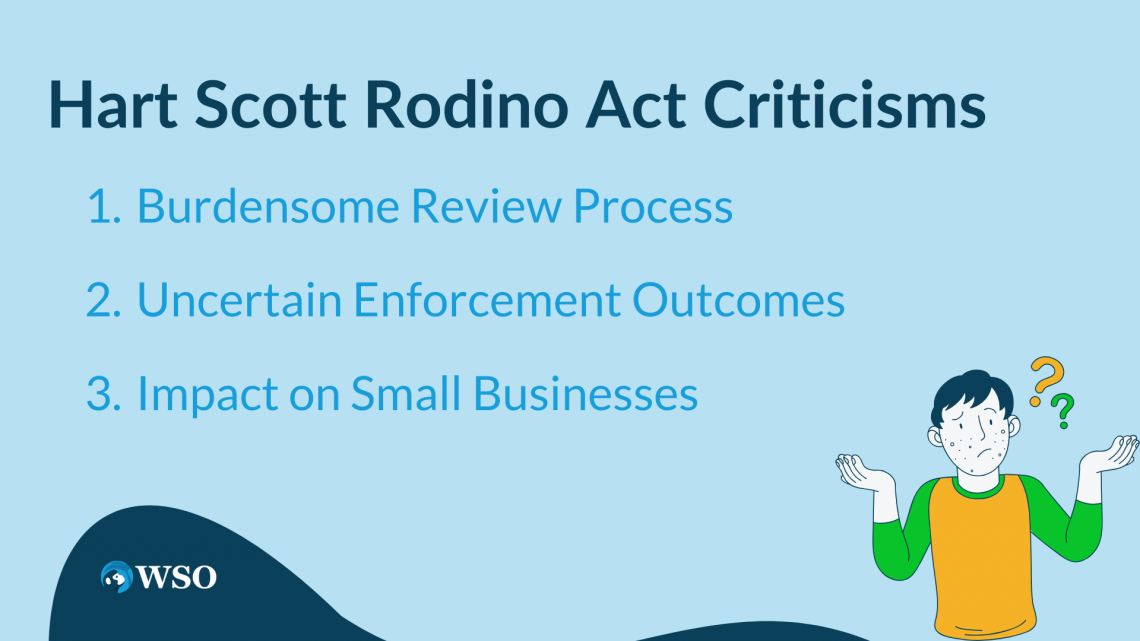Hart-Scott-Rodino Act
It regulates mergers and acquisitions and shields competition and consumers
What Is The Hart-Scott-Rodino (HSR) Act?
The Hart-Scott-Rodino (HSR) Act is a cornerstone of antitrust regulation in the United States, aiming to hold truthful competition and defend consumers' interests.

Enacted in 1976, during a period of heightened merger and acquisition activity, the HSR Act introduced a comprehensive framework that calls for groups concerned with great mergers and acquisitions to inform the Federal Trade Commission (FTC) and the Department of Justice (DOJ) before completing the transaction.
By doing so, the Act empowers these government businesses to evaluate capability antitrust issues and take appropriate motions to maintain aggressive markets.
At its core, the HSR Act turned into a reaction to growing apprehensions concerning the impact of massive-scale consolidations on the opposition.
The 1960s and 70s witnessed growth in mergers and acquisitions, raising issues about the capability and bad consequences of reduced market opposition, including better expenses, restricted patron preference, and diminished innovation.

The Act was named after its three fundamental sponsors: Senator Philip Hart, Congressman Peter Rodino, and Senator Hugh Scott.
Enacted in 1976, the HSR Act requires companies involved in significant mergers to notify the FTC and DOJ for antitrust evaluation.
The primary purpose of the HSR Act is to offer a mechanism for pre-merger notifications and overview processes, allowing the FTC and DOJ to scrutinize transactions earlier before their competition.
By requiring businesses to document certain records about their proposed transactions, the Act provides regulatory businesses with the necessary statistics to assess potential anticompetitive outcomes on relevant markets.
Key Takeaways
- The Hart-Scott-Rodino (HSR) Act, enacted in 1976, regulates mergers and acquisitions and shields competition and consumers.
- The Act emerged in reaction to accelerated merger and acquisition pastime at some point in the 1960s and 1970s and worries about potential bad outcomes on the competition.
- Organizations should be aware of the financial thresholds set by the HSR Act and notify the FTC and DOJ if their transactions exceed these thresholds.
- The Act aims to enable authorities corporations to review and evaluate transactions earlier than the final touch, assessing capacity antitrust concerns.
- The Act's provisions facilitate the enforcement of antitrust legal guidelines, promoting truthful and competitive markets that benefit customers.
Understanding The Hart-Scott-Rodino (HSR) Act
The HSR Act outlines precise thresholds that cause the submitting requirement. Parties should record a pre-merger notification if the transaction price exceeds a positive threshold, adjusted yearly based on the gross countrywide product.

This threshold ensures that the most effective tremendous transactions, in all likelihood to affect competition, undergo regulatory assessment.
Moreover, the Act offers exemptions for certain types of transactions, including the ones concerning nonprofit agencies, foreign entities, and some securities acquisitions.
These exemptions streamline the review system, making regulatory organizations cognizant of their efforts on transactions more likely to raise antitrust worries.
In the end, the HSR Act represents a crucial device in preserving aggressive markets and safeguarding purchaser welfare.

By mandating premerger notifications and evaluation strategies, the Act enables the FTC and DOJ to evaluate capacity antitrust implications of large mergers and acquisitions.
Throughout its life, the HSR Act has played an essential function in preventing mergers that would harm opposition and purchasers, consequently contributing to the renovation of an honest and thriving marketplace.
Hart Scott Rodino Act Purpose
The Hart-Scott-Rodino (HSR) Act serves an important purpose within the United States by offering a framework for pre-merger notifications and evaluation tactics.

The Act promotes competition, protects purchaser welfare, and keeps truthful and efficient markets. Let's discover the purpose of the HSR Act in extra element:
1. Preventing Anti-competitive Mergers and Acquisitions
The primary purpose of the HSR Act is to prevent mergers and acquisitions that could harm competition.
By mandating pre-merger notifications and assessment procedures, the Act empowers the Federal Trade Commission (FTC) and the Department of Justice (DOJ) to evaluate the capacity of antitrust implications of proposed transactions.
This assessment ensures that mergers and acquisitions do not bring about a large lessening of opposition or an introduction of market monopolies.
2. Protecting Consumer Interests
The HSR Act works to protect customer interests via selling competitive markets. Competition often leads to lower fees, improved consumer preference, and improved product quality and innovation.
By stopping mergers that could lead to dwindled opposition, the Act pursues to guard customers against negative consequences, including higher fees and reduced product range.
3. Maintaining Market Efficiency
The Act's premerger notification requirement guarantees that regulatory groups acquire complete statistics about proposed transactions.
This record permits the FTC and DOJ to conduct an intensive evaluation and evaluation of the capability of competitive consequences on applicable markets.
Note
By preserving efficient markets, the HSR Act enables you to foster financial increase, inspire innovation, and save you from marketplace distortions that can get you up from anti-competitive behavior.
4. Preserving Fair Competition
Faire opposition is essential for businesses of all sizes to thrive and succeed. The HSR Act promotes honest opposition by ensuring no single entity gains excessive marketplace energy via mergers and acquisitions.
By scrutinizing proposed transactions, the Act helps save you from anti-competitive practices, which include collusion, price solving, and market manipulation, which could damage both groups and customers.
5. Enhancing Antitrust Enforcement
The HSR Act strengthens the enforcement abilities of the FTC and DOJ in identifying and addressing potential antitrust violations.
By establishing a mandatory premerger notification device, the Act empowers companies to proactively assess transactions before they are finished, enabling them to take suitable moves, including negotiating settlements, implementing situations, or tough mergers and acquisitions in court.
Note
The cause of the HSR Act is to promote fair competition, guard purchaser interests, and keep efficient and competitive markets.
By requiring pre-merger notifications and undertaking thorough reviews, the Act facilitates saving you anticompetitive mergers and acquisitions, ensuring that markets continue to be competitive, customers have choices, and businesses have a stage gambling area to thrive and innovate.
Hart Scott Rodino Act Key Provisions
The Hart-Scott-Rodino (HSR) Act encompasses numerous key provisions that set up the framework for pre-merger notifications and the subsequent overview process.

These provisions permit the Federal Trade Commission (FTC) and the Department of Justice (DOJ) to assess the capability antitrust implications of mergers and acquisitions before they're completed. Let's delve into the key provisions of the HSR Act:
1. Premerger Notification
The HSR Act mandates that events concerned with certain massive transactions need to document a premerger notification with the FTC and DOJ. The submitting parties typically consist of the obtaining company and the target organization.
This provision aims to offer regulatory corporations certain information about the transaction, enabling them to assess potential antitrust issues.
2. Required Information
The HSR Act mandates that the filing parties provide comprehensive facts about the proposed transaction, along with monetary statements, marketplace statistics, and the parties' information.
These statistics enable the FTC and DOJ to determine the capacity competitive consequences of the merger or acquisition on applicable markets.
3. Waiting Period
Upon submitting the premerger notification, a waiting period commences for the duration the FTC and DOJ review the transaction. This waiting period allows the companies to collect extra statistics, request clarifications, and conduct an intensive analysis of capability antitrust implications.
4. Additional Information Requests
During the waiting duration, the FTC and DOJ may additionally request additional data from the filing parties. These records could consist of records about the relevant markets, the competitive landscape, and the potential consequences on clients.
Note
The corporations make use of this information to make knowledgeable decisions about the capacity impact of the transaction on competition.
5. Review and Assessment
The FTC and DOJ analyzed the transaction to decide whether it would bring about a widespread lessening of competition in any relevant marketplace.
They examine elements inclusive of marketplace concentration, capacity boundaries to entry, and the chance of coordinated behavior post-merger. This review process enables the groups to assess the capability consequences on opposition and clients.
6. Remedies and Enforcement
If the FTC and DOJ determine that a proposed transaction increases antitrust issues, they have the authority to take a suitable motion. This can encompass negotiating settlements, enforcing situations at the transaction, or hard the merger or acquisition in court docket.
The HSR Act offers regulatory companies with enforcement tools to ensure compliance and deter anticompetitive behavior.
Note
By incorporating these key provisions, the HSR Act establishes a complete system that enables regulatory corporations to assess and address potential antitrust issues associated with big mergers and acquisitions.
It promotes fair competition, protects patron interests, and guarantees that transactions with capability damaging consequences on opposition go through thorough scrutiny.
Hart Scott Rodino Act Exemptions
The Hart-Scott-Rodino (HSR) Act includes some exemptions that provide relief from the filing and reporting requirements for precise sorts of transactions.

These exemptions are designed to streamline the evaluation procedure and avoid useless regulatory burdens for transactions that might not likely elevate widespread antitrust concerns. Let's explore the exemptions under the HSR Act:
1. Non-profit Organizations
Transactions involving non-profit agencies are exempt from the HSR Act's requirements. This exemption recognizes the unique nature of those businesses and their sports, which might not have widespread implications for competition.
2. Certain Types of Securities Acquisitions
The HSR Act exempts acquisitions of voting securities that don't confer controlling interests. If an acquisition results in the obtaining man or woman holding less than 10% of the extraordinary vote-casting securities of the issuer, it may be exempt from the filing requirement.
Note
This exemption recognizes that minority shareholdings may also have a minimum effect on competition.
3. Foreign Entities
Transactions related to foreign entities are exempt from the HSR Act, provided the transaction is out of doors in the scope of U.S. Commerce. This exemption acknowledges that the Act ordinarily focuses on domestic transactions that have a more direct impact on U.S. Markets.
4. Bankruptcy and Insolvency Proceedings
Transactions due to a financial disaster or insolvency are exempt from the HSR Act's requirements. This exemption recognizes the unique circumstances and urgency often associated with these types of transactions.
5. Intra Corporate Transactions
Certain intra-company transactions, including those related to parent companies and their wholly owned subsidiaries, are exempt from the submission requirement.
This exemption recognizes that such transactions normally do not bring about a massive exchange in marketplace concentration or affect competition.
Note
It is essential to be aware that while these exemptions exist, they no longer absolve parties from complying with other relevant antitrust legal guidelines.
Even if a transaction qualifies for an exemption underneath the HSR Act, it may be subject to review under other antitrust statutes, such as the Clayton Act, which prohibits anticompetitive mergers and acquisitions.
It is well worth noting that exemptions under the HSR Act can be issued to particular conditions or obstacles. Parties seeking to rely upon an exemption need to carefully assess the Act's provisions and seek advice from felony suggest making certain compliance with the law.
Hart Scott Rodino Act Criticisms
The Hart-Scott-Rodino (HSR) Act, despite its objectives to promote opposition and defend client interests, has faced criticisms considering its enactment.

While the Act has tested powerful in addressing antitrust worries, a few argue that it could have unintended effects and impose burdensome necessities on businesses. Let's discover some of the common criticisms of the HSR Act:
1. Burdensome Review Process
The HSR Act's assessment process may be perceived as time-consuming and burdensome for groups. The waiting duration, at some stage in which the regulatory agencies overview the transaction, can result in delays in completing mergers and acquisitions.
Critics argue that these delays can avoid enterprise operations, strategic making plans, and capability efficiencies that might get up from well-timed transactions.
2. Uncertain Enforcement Outcomes
Another complaint originates from the vulnerability encompassing the requirement results of the HSR Act. Parties might be dubious about the ultimate choice of the Federal Trade Commission (FTC) and the Division of Justice (DOJ) concerning the proposed exchange.
This uncertainty can deter potential transactions or cause negotiations and conditions that won't be useful for the parties involved.
3. Impact on Small Businesses
Smaller groups may additionally face specific demanding situations underneath the HSR Act. The filing fees related to notifications can be burdensome for smaller businesses with limited resources.
The Act's requirements might also create boundaries to access and avert smaller groups' potential to compete efficiently inside the market.
Note
It is vital to word that even as those criticisms exist, the HSR Act has also played an important role in stopping mergers that could harm competition and customers.
The Act's provisions have helped hold fair and competitive markets, making sure that capacity antitrust worries are thoroughly evaluated before transactions are finished.
While the HSR Act has its critics, it keeps playing a significant role in retaining truthful competition in the marketplace, striking stability among regulatory oversight, and facilitating beneficial transactions.
Conclusion
The Hart-Scott-Rodino (HSR) Act in the United States provides a regulatory framework for mergers and acquisitions to protect opposition and patron welfare. Since its enactment in 1976, the Act has performed a crucial function in retaining honest and efficient markets while preventing anticompetitive conduct.

The HSR Act's pre-merger notification requirements and next overview strategies have allowed government businesses, which includes the FTC and the DOJ, to evaluate the ability of antitrust implications of proposed transactions.
By conducting thorough analyses and tests, the Act ensures that mergers and acquisitions do not bring about a giant lessening of opposition or introduce monopolistic market systems.
The Act's primary purpose is to shield customer interests. By promoting opposition, the HSR Act enables certain cost decreases and improved product quality and innovation.
By preventing mergers that would damage opposition, the Act acts as a guard in opposition to capacity-poor consequences, including better fees and decreased product range.
Additionally, the HSR Act contributes to preserving market performance. By requiring complete statistics about proposed transactions, the Act enables regulatory organizations to make knowledgeable choices.
Note
While the HSR Act has faced criticisms, low monetary thresholds, and burdensome evaluation procedures, it remains vital in antitrust enforcement.
This promotes economic growth, encourages innovation, and prevents marketplace distortions from springing up from anti-competitive practices.
Efforts to deal with those criticisms, such as adjusting thresholds and supplying steering to corporations, were made to decorate the Act's performance and reduce uncertainties.
The HSR Act has established a robust framework for pre-merger notifications and critiques that sell honest opposition, shield purchaser hobbies, and maintain green and competitive markets.
By preventing anticompetitive mergers and acquisitions, the Act ensures that markets remain dynamic, clients have choices, and corporations perform on a level gambling subject.
The Act is a key pillar of antitrust law in the United States, selling all stakeholders a healthful and thriving economic environment.
Hart Scott Rodino Act FAQs

The HSR Act aims to regulate mergers and acquisitions, shield opposition, and ensure purchaser welfare. It calls for companies to notify the FTC and DOJ of proposed transactions that exceed certain monetary thresholds.
The Act aims to prevent anticompetitive behavior, hold marketplace performance, and sell fair competition.
No, there are exemptions underneath the HSR Act. Transactions concerning nonprofit groups, some varieties of securities acquisitions, overseas entities, outdoor U.S. Trade, financial ruin proceedings, and intra-corporate transactions can be exempt from the submitting requirement.
However, exemptions no longer absolve events from complying with other relevant antitrust laws.
The HSR Act has faced criticism regarding burdensome evaluation techniques, uncertain enforcement outcomes, useful resource allocation worries, and potential impact on small corporations.
Critics argue that those factors can bring about needless expenses, delays, and uncertainties for corporations.
The HSR Act benefits corporations by imparting them with a regulatory framework that promotes truthful opposition and a stage gambling field.
It prevents anticompetitive mergers and acquisitions that might damage businesses using decreasing opposition and limiting marketplace access.
By preserving competitive markets, the Act encourages innovation, fosters monetary increase, and allows corporations to thrive based totally on advantage in preference to unfair marketplace blessings.
Additionally, the Act offers transparency and fact in the evaluation system, allowing corporations to devise and strategize successfully.
While the Act may also impose submitting necessities and undergo overview approaches, its reason is to ensure a healthful competitive environment that ultimately advantages groups.
The Act promotes competition, which leads to lower expenses, increased customer choice, and improved product quality and innovation.
By stopping mergers that would harm opposition, the HSR Act safeguards customers from terrible results, such as reduced competition and better prices.















or Want to Sign up with your social account?